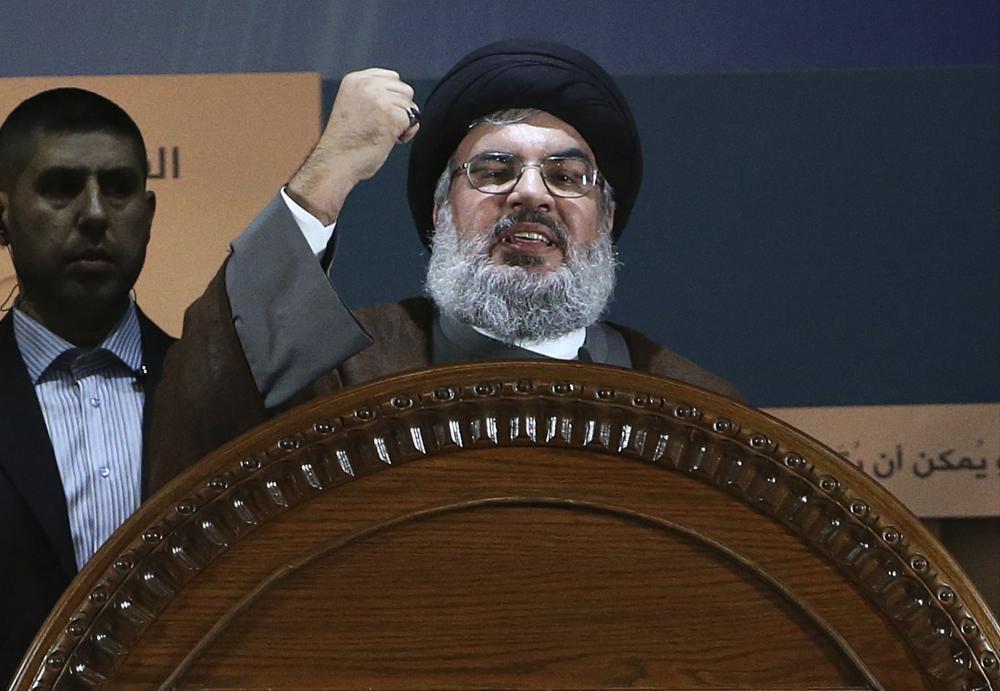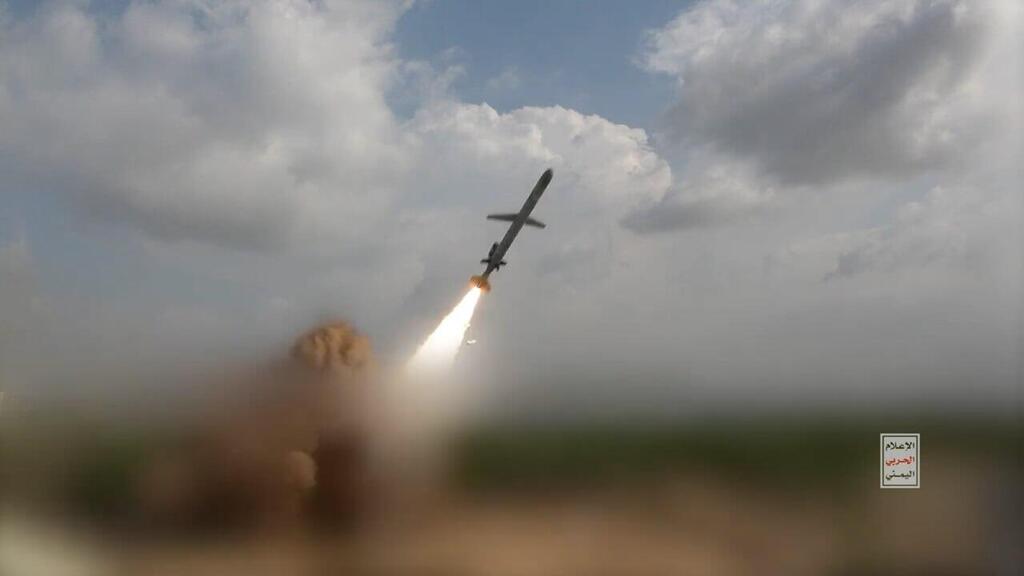Getting your Trinity Audio player ready...
The face of Yahya Sare'e, Houthi military spokesperson, has become increasingly prevalent on our screens since the Israel Defense Forces' ground offensive began operating deep inside the Gaza Strip, with the posting of no less than four official videos in which he looks all spiffy and organized in his military uniform, often needlessly raising his tone to make a point, and all too eager to take credit for events instigated by the Yemenite Iranian proxy against southern Israel and its Red Sea naval presence.
Read more:
As war erupted in Gaza Strip, Yemen too caught pro-Palestinian fever, with massive rallies sprouting left and right, in which they expressed concern about their "Palestinian brethren." The first of many messages from the Houthi army's spokesperson came on October 30, each video announcement coming after a drumroll of preliminary updates. Houthi forces usually drop two teasers before the main event – a "coming soon" trailer, followed by a more precise "save the date" announcement timed to Yemen local time. Between these official spiels, they add extra footage showcasing their attacks.
Sare'e announces seizure of a cargo ship by Houthis
In his inaugural official address, Yahya Sare'e couldn't resist diving into the details of an assault the Houthi forces had allegedly conducted on Israeli soil. "Our armed forces launched a large barrage of ballistic missiles, guided missiles and a large number of anti-aircraft missiles at various targets of the Israeli enemy in the occupied lands," he announced.
On November 9, the Houthi army spokesman was back on the airwaves, bringing his usual formal tone to yet another claim of an attack by the Yemeni Houthi forces. "The armed forces launched a barrage of ballistic missiles at various and sensitive targets of the Israeli enemy in the occupied lands, among them military targets in the area of Umm Rashrash, Eilat. The activity successfully achieved its goals and resulted in direct hits on the designated targets," he claimed.
Just last week, the Houthi army spokesman was back at it again, this time with a threat that sent chills down the spine. "The armed forces will not hesitate to target any Israeli ship in the Red Sea or anywhere we can reach from the moment of this statement," he warned.
November 14 saw the third message from our Houthi spokesperson; but it was the message on Sunday, November 19, that really made the words come alive. Barely a few hours before reports of an Israeli-owned ship being taken over started to trickle in, the Houthi military sent out a written message.
It was a heads-up of sorts, an 'FYI' that they've got their sights set on certain types of vessels: those flying the Israeli flag, those operated by Israeli companies, and those owned by Israeli companies. Houthi forces also issued a worldwide SOS. An appeal to all nations to pull their citizens off these ships, to steer clear of shipping or working on these vessels, and to keep their own vessels at a safe distance.
By Sunday afternoon, whispers of an "Israeli" ship falling into Houthi hands were already making the rounds. Not one to miss a beat, Sare'e was quick to promise an official Houthi army statement by evening. As the hours ticked by, details started to emerge – the crew members weren't Israeli after all, and the ship in question was the "Galaxy Leader," a fine vessel sailing under the flag of Ray Shipping, part-owned by Israeli business magnate Rami Unger.
As the evening wore on, Sare'e went on to release a fourth video since the start of the war in the Gaza Strip. His words painted a picture of strategic triumph: "The Houthi naval forces carried out a military operation in the Red Sea, took control of an Israeli ship and took it to the coast of Yemen. The Houthi forces treat the ship's crew in accordance with the values of the religion of Islam. The forces renew their warning to all ships belonging to or working with the Israeli enemy that they will become a legitimate target for the Houthi army."
Relations with the Saudis getting warmer
The Houthi forces seem to understand that appearances matter. A glance at their pre-war videos shows a contrasting tone and less consideration for the presentation and delivery of the message. However, as war unfolds, it's evident the Houthis are playing up the visibility card. They want to underscore their commitment to the fight alongside the Palestinian people, as well as being equally keen to portray themselves as a pivotal part of the Iranian-led Axis of Resistance.
This shift has not gone unnoticed; it's echoed in the speeches of high-ranking officials within the axis. Take Nasrallah, for instance. He lauded the Houthis' efforts, saying in his address: "Yemen took a bold, strong and official position and sent missiles to Israel. Aid from Yemen is meaningful even if the missiles did not arrive, and we thank them. It gave support to the resistance fighters and put pressure on Israel."
Let's take a moment to understand the backdrop against which all of this is playing out. Yemen has been embroiled in a bitter civil war for years now, with the Houthis effectively staging a coup d'état and seizing control of numerous institutions within the country. Over time, this internal conflict has morphed into a broader power struggle, a tug-of-war if you will, between Iran (backing the Houthis) and Saudi Arabia (opposing the Houthis alongside other factions). This battle forms a significant part of the larger Sunni-Shiite power struggle that's been unfolding in the region.
In a twist of irony, right before the war erupted in the Gaza Strip, there were whispers in the media of potential Yemen peace talks. Reports circulated about advanced discussions for a cease-fire in Yemen. A glimmer of hope, extinguished all too soon.
On Tuesday, Hazam Al-Assad, a politically influential member of the Houthis' Ansar Allah Supreme Political Council, known for his outspoken stance against Israel, including tweets in Hebrew, appeared on a program on the Al-Araby Al-Jaded news website. During the conversation, Al-Assad addressed the situation with Israel and its impact on talks with Saudi Arabia. He remarked that the conflict with Israel "did not influence the progression of the dialogues and agreements with Saudi Arabia."
3 View gallery


Nasrallah making friends with the Houthis as part of Shiite demonstration of power
(Photo: AFP)
During the conversation, Al-Assad further elaborated that the discussions were ongoing, and agreements were being shaped. He stressed that even if American interference were to occur, they would sustain their belligerence against Israel. He pointed out that the details regarding this issue would be disclosed by those participating in the national dialogue delegation in Muscat, Oman, who are authorized to comment on this matter.
Moreover, an article published alongside Hazam al-Assad's statements announced that Al-Araby Al-Jadeed had obtained information from sources in Yemen. According to these sources, there are initial understandings between Saudi Arabia and the Houthis in Yemen about announcing a cessation of hostilities between them. This development coincides with the new diplomatic missions initiated by the American envoy to Yemen, Tim Lenderking, and the UN envoy to Yemen, Hans Grundberg, in the region.







